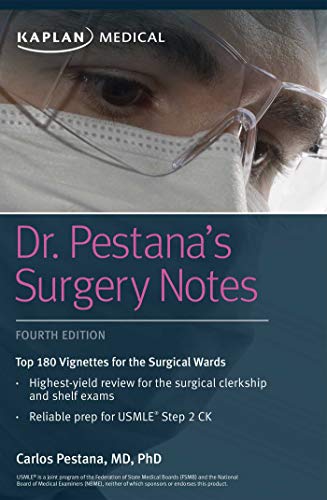If you’re currently working on your surgery rotation or you’re planning to start your surgery rotation, you may be getting a little bit curious about the NBME surgery shelf. After all, if you’re going to take this exam, you want to make sure that you’re going to do well on it, right? Well, that’s exactly what this guide is going to be all about.
For those who are wondering just how to pass surgery shelf, we’re going to dig into the most essential tips, what’s on the test, what books you really need to be studying, and even the questions that you should be using. We’ll also look at some of the most popular lectures and notes that you may want to look into, so you have the best resources for your surgery rotation.
No matter where you are on your path through medical school, you’re going to need to have a firm understanding of surgery, and this guide is going to help you along. Whether you’re just looking to pass or you want to know how to honor your surgery rotation, we’re going to give you the information that you definitely don’t want to miss.
Who Should Study for NBME Surgery Shelf?
First up, who should actually be studying for this exam? Is this actually something that you should be taking or that you need to do? Well, if you’re taking the surgery rotation, then you’re likely going to need to take this exam, and if you’re in medical school, you’re going to be taking a surgery rotation.
The main reason you’ll need this exam is because it’s used to pass you through your course or your clerkship. So, if you’re going to take the exam, you absolutely need to make sure that you’re studying for it. No one should be walking into this exam blind because it’s such an essential part of your medical school training.
How to Get Started Studying for Surgery Shelf?
Now that you know you should be taking this exam for yourself, you should know how to get started with studying. The most important thing is starting out right because that’s going to set you up for the rest of the process while you’re completing your rotation. We’re going to take a look at some of the first few steps and most important concepts that you absolutely need to know when you start out.
1. Set your schedule.
One of the first things you need to do is set up a surgery shelf study schedule. You want to take a look at each of the different materials that you’re going to use (which you can take a closer look at below) and how long you have to study (6 weeks or less depending on where you are on your rotation). From there, divide out how many cases you’ll need to study each day or how many questions you’ll need to answer to get through everything in time.
2. Keep the basics in mind.
You’re going to find areas in the shelf exam where you’re given a whole lot of extraneous information, but the real answer is going to be noticeable. Don’t get overwhelmed by information and start coming up with answers that aren’t important. Look for the basics first. The most obvious answer is generally the one that you need.
3. Start studying immediately.
This exam is one that’s going to be difficult, and it’s definitely been known to stump a number of students. Starting your study process as early as possible is going to set you up much better, and it’s going to help you feel more confident going into the process as well. You’ll want to spend a lot of time on studying, even as you’re living it out in the rotation. You’re not going to have a chance to see everything in just eight weeks, after all.
What Topics are Covered on the Surgery Shelf Exam?
Before you spend a whole lot of time on studying and research and books and things, it’s a good idea to know exactly what’s covered on the shelf exam. You don’t want to spend a lot of time on things that you’re not even going to need to know or that no one is going to test you on. So, what should you be looking at first? The truth is there’s a lot on this exam, but we’re going to present it here.
| Gastrointestinal system | 20-25% |
| Cardiovascular system | 10-15% |
| Respiratory system | 8-12% |
| Blood & lymphoreticular system | 5-10% |
| Nervous system & special senses | 5-10% |
| Multisystem processes & disorders | 5-10% |
| Musculoskeletal system | 3-7% |
| Renal & urinary system | 3-7% |
| Female reproductive system & breast | 3-7% |
| Endocrine system | 3-7% |
| Immune system | 1-5% |
| Skin & subcutaneous tissue | 1-5% |
| Male reproductive system | 1-5% |
| Social sciences | 1-5% |
Each of these topics is presented in order from what’s going to be most prevalent to the least frequent, so you know where you should be focusing your attention. Keep in mind also that the vast majority of the exam is going to be focused on diagnosis. It’s also going to concentrate on patients between 18 and 65 primarily. The split between ambulatory, emergency, and inpatient care, however, is very close to the same.
The Best Books for Prepping for the Surgery Shelf Exam
If you learn best through books, then these are the ones that you’re going to want to take a look at. Truthfully, these are an excellent resource even if you don’t typically do well with books because they’re going to give you a strong foundation of the information that you need including some of the key elements, an understanding of how to read and interpret cases and a study of how to make a diagnosis and recommendation. Take a look at each and see which ones are the best for your needs.

Step Up to Medicine
This book is another one that’s very common when it comes to studying for any of your medical clerkships or exams. In this book, you’re going to want to focus on areas like acid/base/electrolyte & GI. These are two of the most relevant topics to your surgery shelf, which means that a good portion of the book isn’t going to be as necessary, but these two are. In fact, the importance of these two sections is reason enough to get this textbook.
What’s great about this book is that you’re going to have clinical pearls, color illustrations, and easy-to-remember information. In fact, it’s designed to present everything in as simple a format as possible so that you can remember it, no matter how you tend to learn best.
What Makes it Unique:
- Focus on quick hits and clinical pearls
- Full color for more visual learners
Why Choose This Surgery Shelf Exam Book:
- Focuses on high-yield content without excess
- Great guide for most shelf exams and USMLE exams
- Agabegi MD, Dr. Steven (Author)
- English (Publication Language)
- 584 Pages - 05/08/2019 (Publication Date) - LWW (Publisher)
Last update: 2024-04-28

NMS Casebook
If you’re looking for a book that’s going to help you better understand standard procedures and how to manage a patient, then this is a great book to go with. That’s precisely what it’s designed to do. It’s actually a companion to the Surgery book, but it can also be used as a standalone option to help you understand patient management and the steps that you need to follow.
If you do read it alongside the other text, everything inside is complementary to each other, so you’re guided along at the same pace. There are plenty of details related to surgery, treatment, management and more. If you’re looking for more in-depth information from other texts that you’ve been working through, then this is a great way to go about it.
What Makes it Unique:
- In-depth review of content
- Great pairing with NMS Surgery book
Why Choose This Surgery Shelf Exam Book:
- Interactive and organized procedure guide
- Teaching clinical thinking rather than just rote memorization
- Jarrell MD, Bruce (Author)
- English (Publication Language)
- 550 Pages - 09/01/2014 (Publication Date) - LWW (Publisher)
Last update: 2024-04-28

DeVirgilio: Surgery
If you’re looking for a comprehensive guide to everything related to surgery, then this is the book for you. It’s over 700 pages long and offers a detailed dive into topics of surgery that are on your shelf and even topics that aren’t. That’s what makes it so great for those who are looking to really learn the topic inside and out. If you’re just studying for your exam, however, you’ll likely be able to skip over some of the sections.
The questions throughout are designed to give you an idea of what the shelf exam is going to look like, which means that they’re definitely not going to be easy. You will get explanations and definitions that will help you understand everything that’s being said and will help you know why you’re getting some of the questions right or wrong.
What Makes it Unique:
- Highly detailed dive into all aspects of surgery
- Offers images, charts and other visual breakdowns
Why Choose This Surgery Shelf Exam Book:
- More detailed case files than other books
- Great for visual and textual learners
- English (Publication Language)
- 723 Pages - 01/11/2015 (Publication Date) - Springer Nature (Publisher)
Last update: 2024-04-28

Dr. Pestana’s Surgery Notes
This is perhaps one of the most commonly discussed books for studying for the surgery shelf. It’s an excellent overview and introduction to what you’re going to need to know, which will help you prepare for some of the other texts and question banks that you may want to take a closer look at. It’s going to give you 15 essays regarding diagnostic tools and therapeutic tools, as well as 180 questions to go over.
You’re essentially getting a concise book regarding all of the high-yield topics that you’re going to need to know in order to be successful on your surgery shelf. This is also a small book that’s going to be simple to take along with you because it actually fits directly into your lab coat. Add in the illustrations and the fact that it really gets to the point, and you’re going to love this one.
What Makes it Unique:
- Brief but comprehensive guide
- Updated frequently for new information
Why Choose This Surgery Shelf Exam Book:
- Easy to carry with you while on rotation
- Good overview of all areas for your surgery shelf
- Pestana, Dr. Carlos (Author)
- English (Publication Language)
- 264 Pages - 10/02/2018 (Publication Date) - Kaplan Publishing (Publisher)
Last update: 2024-04-28
The Best Questions and QBanks for the Surgery Shelf Exam
Question banks can be great because they give you the opportunity to practice the types of questions that you’re going to see on your exam. Not only that, but you’re going to have the ability to take these questions along with you wherever you go. They generally have apps or at least mobile versions to the website that allow you to study wherever you are without having to lug around heavy books. These are some of the best surgery shelf questions you’ll find.
OnlineMedEd – You may have heard of this question bank from some of your fellow students, and there’s a reason that it’s become so popular. They’re actually great for those who are a little more prone to procrastinate because everything is short and sweet. You can actually go through the questions as well as through the outlines, which are only a couple of pages in length. That gets you an overview that you can use for last-minute prep.
Uworld – It’s not a surprise to find this question bank on the list for any medical exam, and that’s because they definitely know what they’re doing. You already knew you were going to have Uworld for shelf exams. You’re going to find a whole lot of different questions here, including about 150 that are dedicated to surgery. You can add in questions about internal, pulmonary medicine, GI, and cardiovascular while you’re at it to get a more well-rounded study material.
How and When to Use DeVirgilio for Learning Surgery Shelf
This book is going to be one of the best that you’ll find, and it’s well recommended by students and even the schools that they attend, which should tell you something. It focuses on things like case-based information and then discusses the most likely diagnosis and treatment as well as why you wouldn’t choose other diagnoses or treatments. This can get you used to making informed decisions for your own cases.
Start day one. This is a really long book at over 700 pages, and that means you’re going to want to start reading it right away. If you tend to be a slow reader or you just struggle to get into a medical text, especially this will give you plenty of time to start working your way through. Make sure you dedicate a little time each day to reading.
Evaluate the cases. Read through the cases and make sure that you’re thoroughly evaluating the presentation and coming up with your own recommendations and diagnoses. Create your own action plan before you read through the responses and the actual recommendations that you should be making. This will prepare you for pulling out relevant details.
How and When to Use Dr. Pestana’s Surgery Notes
You might actually be surprised at just how short this is when you consider just how much everyone recommends it. The entire book is only about 140 pages, and you’re going to have less than 200 practice questions. Even still, it’s a book that you’re not going to want to miss because it gives you a great deal of information that is invaluable for your exam.
Start early. The best thing you can do is read this book right away. When you first start your surgery rotation, read through the entire book to get a strong foundation and overview of much of the information that’s going to be included on your shelf exam. You’re going to have a relatively good place to start.
Fill in the blanks. This book just gives you an overview, so you’re then going to need to take a look at some other resources (like the ones we mentioned above) that will help you to fill in the rest of the information and get a stronger understanding of the most critical areas.
Reread it. Once you get to the end of your rotation and you’ve had time to review other study materials, you’ll want to take a look back at this book again. Try to reread it in the week before you’re going to take your shelf. It will help you to refresh on some essential information and serve as a way to highlight the critical sections.
Wrapping Things Up: 3 Final Tips for How to Study for Surgery Shelf
Finally, we’re going to look at three last tips that you should know and that you should be paying attention to when it comes to studying for your surgery shelf. These are some of the things that have proven highly effective for other students and that are definitely going to make a difference in the way that you study and how well you do. Add these in with your top books and questions, and you’re going to be off to a great start.
1. Take the practice exams.
NBME has a total of four different practice tests available, and these tests can make a huge difference for you. They can give you an idea of what the test is going to look like, help you get comfortable with the format and timing, and also get you comfortable with different topics. You’ll be able to see where you’re struggling and focus more attention in that area.
2. Use different methods of study.
Don’t just focus on a single text or a single question bank. Look for a mix of different options. Use one or two texts as well as at least one question bank and maybe even look for audio and video sources (Dr. Pestana does offer audio lectures). This will get your mind used to different styles of learning and help more information to stick.
3. Focus on when to operate and how to operate.
The most critical aspects that you’re going to find are generally being able to differentiate when an operation is necessary versus when it’s not and how you go through the process of the operation. These two concepts are going to form a strong basis for what you’re going to be working through in the exam.
Hopefully, all of these tips are going to make it easier for you to get the score that you want on your surgery shelf. Whether you’re taking advantage of each of the books or several question banks, you’re going to be better prepared for what comes next on your medical school journey. Just make sure you’re taking a closer look at DeVirgilio and Dr. Pestana to help you along with how to ace your shelf exams.
Did you enjoy this post? Then you may like our other shelf study guides:
> How to Study for OB/GYN Shelf
> How to Study for Family Medicine Shelf
You may also like our section on the site for medical school study tips.
















